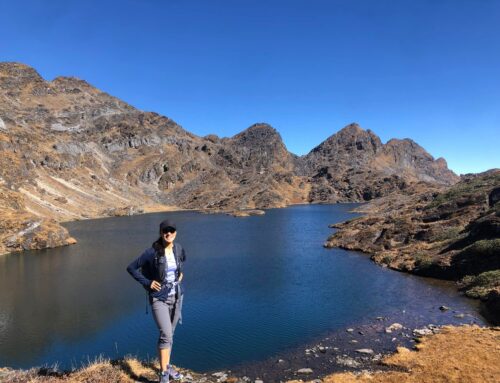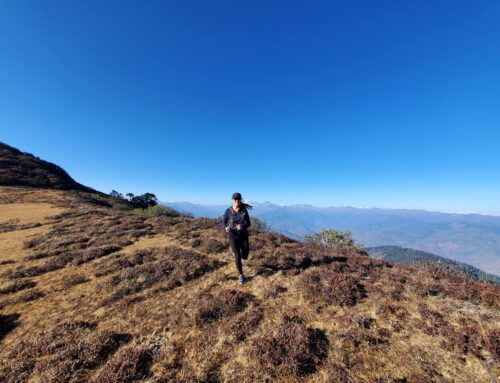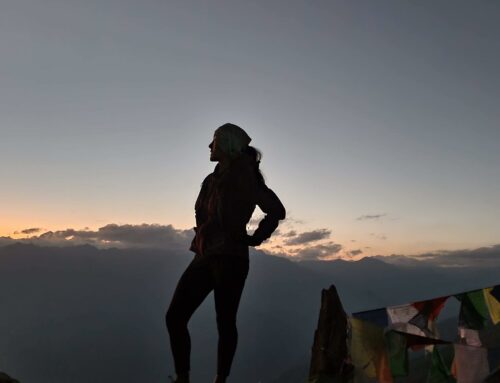Day 16 - you want to read from the beginning? Please start here!
9.December 2019, 2:00 pm in Guwahati, Assam, India - I sit frozen by the salt owl in the back seat of a taxi that has stopped at a roadblock made of burning car tires. There is a curfew, which is why not a single soul can be seen on this normally very busy motorway, only the taxi driver and me. And then, out of nowhere, three scowling men approach us. My senses are focused, I try to see in the eyes of men how they perceive me. I stay calm, don't provoke them, but I don't let anyone out of my sight - not even my driver, who remains calm on the outside but must have been at least as tense on the inside as I was at that moment. Because even if the men did not show that they recognized me as a Western tourist (and of course I had memories of reports of violent attacks on Western women in Delhi and Mumbai floating around in my head) they did not look like to be there for a nice smalltalk. I was surprised that my driver half opened his side window when one of the men approached. This man also tried to open the door, but stopped trying when he realized the car was locked. The looks though were hostile. I didn't understand a word of the little exchange. Then followed, however, hateful words in English, addressed to my driver, but supposed to be understood by me: "You are a Muslim, a bloody Muslim! ....".
The famous chill ran down my spine, but like the driver, I showed no reaction. Instead, he quietly closed his side window, operated the clutch and drove past the roadblock to the right at walking pace and then quickly moved away from the small group watching us, continued on the still empty lane, now back towards the airport. Then he slowly turned to look at me - and those bright, smiling dark eyes of the young man who had previously been threatened with racism are burned into my memory.
I called Tshering again, and this time insisted that he stay on the phone until we got to the hotel. But we weren't lucky, the hotel was fully booked for a wedding. My heart sank in my pants - how should it still be possible to find safe accommodation elsewhere? In fact, my driver drove to several smaller hotels in the suburbs between the center of Guwahati and the airport - and everyone just shook their heads. Tshering was on the phone the whole time and the driver explained to him that he still knew one possibility, but then his ideas would also be exhausted. We reached a courtyard entrance - on the street there was a medical infirmary with a medicine dispenser and further back in the courtyard was a typical Indian 5-story concrete block with a free-standing staircase. It turned out to be a traveling trade guest house run by a Christian community. In the reception office several other Asian travelers were waiting with their suitcases and backpacks - and I was literally assigned the last room that was still free. I was safe - and my driver was paid far more than the originally negotiated 1500 rupees and was happy ... It soon got dark and in the early evening, despite the curfew, a peaceful torchlight procession of demonstrating students passed the guest house. This demonstration was clearly not determined by the racist aggression I had encountered at the roadblock that afternoon - the tension of the day had now given way to a sad, depressed mood.
The next morning I woke up to the sunrise and the singing of a muezzin. Tshering had finally reached the other hotel and was able to bill me there for the next few nights. But I never left the hotel premises because the state of emergency continued. Two days later, Tshering was allowed to leave Bhutan and with the driver he had booked we returned to the border with Bhutan after a last night in Guwahati.
It was only with great effort that I gained the full picture of the causes for the current political tensions out of the Indian media that could be received in the hotel. They started out from several cities in Assam, but in the same week they spread across the whole country and there was also unrest in Bangladesh. When I flew back to Delhi from Bhutan at the end of December, where I stayed for 24 hours until my flight back to Europe, I only left my hotel at the international airport to eat in a neighboring mall. I actually wanted to visit the old town in Delhi, but until well into January there were violent riots and racist attacks on peaceful Muslim civilians who had been living in Delhi for several generations.
It was triggered by a new citizenship law that had been ratified on the day I left for India: an amnesty was issued for migrants that enabled them to acquire the right to stay in India for life. However, Muslim migrants were explicitly excluded.
A few days later, when the daily curfews were lifted, Tshering and I reached the Indian border town of Sashipur in Darranga Province. There was no sign of the tension of the past few days. We passed a Hindu temple and paused curiously: There was cheerful activity, obviously a prayer hall was being prepared for a large festive event. A man came up to us beaming with joy and warmly invited us both to visit the temple complex. Preparations were made for an important holy festival the following day, for which several thousand pilgrims from northeast India were expected. He was wearing a white and red patterned scarf that I had seen a lot in Assam over the past few days - especially under the pictures of students demonstrating at peaceful rallies. I asked him what this scarf meant - and with his explanations the whole picture slowly opened up to me: The scarf is a symbol of the integrative diversity in Assam, the man explained it to me patiently. In no other region do Hindus, Muslims, Buddhists and Christians live so amicably with one another as in Assam. And immediately the picture sat together like Tetris stones: I remembered the wake-up call of the muezzin on December 10th near the Christian-run guest house. When I drove the route from Guwahati to Sashipur for the first time in October 2014, there were brightly painted paper mache figures along the entire route, adorned with incense candles that embodied the most important Hindu deities and were lit for the Hindu New Year festival, Diwali. There were several Christian churches and schools in Darranga that I had noticed earlier - and at one point on the slope above the palm trees at the roadside a huge gold-plated Buddha statue looks down the valley. The man from this Hindu community kindly and sincerely explained to us that no one in this community endorsed the new citizenship law.
The students and intellectual demonstrators that I had seen wearing these scarves on television and at the evening torchlight procession in Guwahati protested against its implementation and, incidentally, supported by the regional government of Assam - they refer to the democratic and ethical values of the founder of the state, Mahatma Gandhi.
The men I met at the roadblock in the taxi did not share this attitude at all. The latest decision did not go far enough for them - and neither did the attackers in Delhi's old town, or the hooded activists who set fire to the dormitories of student opposition members of the nationalist government under Modi in January 2020, or the attackers in Mumbai who did so in December 2019 where they burned trains - they all want to promote ethnic division.
The evening after the warm hospitality in the Hindu community, Tshering showed me a video that he had received via social media. It was a scene from the demonstrations in downtown Guwahati that must have happened just hours before I landed. The cameraman was standing directly behind a policeman from the Indian National Police. Over the shoulder of the policeman, a group of demonstrators can be seen in the distance, occupying the entire street, but moving without aggression or hectic. You see the policeman aiming his rifle and shoot, without any warning. As if looking through the telescopic sight of the rifle, one sees two young men moving calmly, collapsing down to the corridor. 4 protesters were fatally hit at that moment. The policeman was wearing the same national uniform as the two men who spoke to me a few hours later at the airport …
I am not entitled to judge the government of a country in which I did not grow up and whose culture I only got to know through a few trips and friendships with compatriots.
I only know that I have never in my life felt such intense FEAR and at the same time such deeply rooted COURAGE as I did in the back seat of the taxi at the roadblock. The hospitality and loving kindness of the Hindu master reinforce the echo of courage - and I understood what humility means: to endure fear and to understand for the first time physically and mentally what a perfidious driver of fear is the division and oppression of minorities in a society. And at the same time to activate your inner sources of strength and not let this fear provoke you - like my taxi driver. It was all in the look in his shining eyes when he turned to me, relieved but also filled with gratitude and deep connection.
Further background information on ethnic tensions in India: Citizenship Amendment in India




